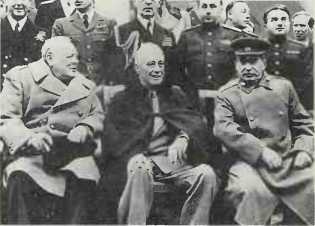Island-hopping strategy, but it also imposed upon Japan an economic and military blockade which fatally undermined her strategic freedom of action. The remaining questions were whether the Japanese surrender could be secured without an American invasion and, if not, how many lives that invasion might cost. The matter was settled when, on August 6 1945, an American B-29 dropped the first atomic bomb on Hiroshima and the Russians declared war on Japan. On August 9 the second atomic bomb was dropped on Nagasaki. On August 10 the Japanese sued for peace.
World War II cost about
15,000,000 military dead and missing and, due to Nazi policies towards Jews, Slavs and the Russians, many more civilians. ANF.
Wrangel, Gen Baron Petr Nikolaevich (1878-1928). Russian. One of the ablest “White” commanders of the Russian Civil War, whose Caucasus Army defeated the Reds in January 1919 and swept on to Tsaritsyn (Stalingrad, now Volgograd). Supply problems enforced Wrangel’s retreat but, replacing Denikin early in 1920, he launched an offensive from the Crimea, successful until the ending of Russo-Polish hostilities allowed Bolshevik reinforcement. Defeated at Perekop, November 1920, Wrangel’s troops were evacuated by British ships.
Wright brothers. Wilbur (18671912), Orville (1871-1948). (US). Interested in flying from 1894, they built a kite in 1899, a manned glider in 1900, two further gliders 1901-02, and a powered biplane, which flew December 17 1903.
Wurzburg. German ground-based radar for plotting aircraft. Introduced summer 1941.
Wyoming Line see Kansas line.
Wytschaete. Village a few miles south of Ypres and one mile north of Messines, captured by the Germans in November 1914 and retaken on June 7 1917. The following April the British were forced to abandon the ruins but Wytschaete was regained during the Anglo-Belgian attack in Flanders on September 28 1918.
X
X-craft see submarines.
X-Gerat and Y-Gerat. German systems of beam navigation similar to but distinct from Knickebein.
Xuan Loc, Battle of (1975). Xuan Loc, 40 miles (65km) northwest of Saigon, was one place where the ARVN offered stiff resistance to the advancing People’s Army (pavn) in spring 1975. The pavn opened its attack on March 17, and by April 9 three pavn divisions supported by heavy artillery were involved. The exhausted arvn 18th Division finally fell back on Bien Hoa on the 15th. The pavn accepted heavy casualties at Xuan Loc in order that other units could manoeuvre into place for the assault on Saigon.
Xuan Thuy (1912-1985). Democratic Republic of Vietnam. Once Hanoi’s Minister of Foreign Affairs, Xuan Thuy headed the North Vietnamese delegation to the Paris Peace Talks, May 1968. While remaining head of the delegation until agreement was reached (January 1973), Thuy was in fact supplanted as Hanoi’s chief negotiator by Le Due Tho when secret negotiations between Tho and Kissinger began in 1970.
Yabasi see cameroons (1914-16).
Yakovlev Yak-9 (USSR, WWII). Single-seat fighter (low-level and ground-attack), developed from Yak-7; introduced operationally late November 1942; improved version with increased range (Yak-9D) early summer 1943. Yak-9T had 37mm cannon for tank-attack work; other sub-types with armament and equipment changes were built; production until 1947, total 16,769. Outstandingly effective in combat. One l,360hp Klimov M-105PF-3 engine; max. speed (Yak-9D) 374mph (602kph); one 20mm cannon, one 12.7mm machine gun.

The “Big Three” at the Yalta Conference
Yalta Conference (“Argonaut”). Meetings between Stalin, Roosevelt and Churchill in the Crimea, February 4-11 1945.
Although there was some discussion over the plan to bomb Dresden, most of the negotiations regarding Europe were concerned with postwar arrangements. It was agreed that major German industry should be destroyed or brought under Allied control, that Germany should be divided into zones to be occupied by each of the main allies and that war criminals should be brought to trial. There was discussion of the liberated countries, including Poland and Romania, but the fact that they were occupied by the Red Army meant that Stalin was not inclined to listen to the Western allies’ views. The future constitution of the United Nations was discussed and Russia undertook to enter the war against Japan shortly after the surrender of Germany. ANF.
Yalu, Battle of the see kiu-lien-
CHENG.
Yalu river (the Amnok to the Koreans). Forms the border between North Korea and China.




 World History
World History









